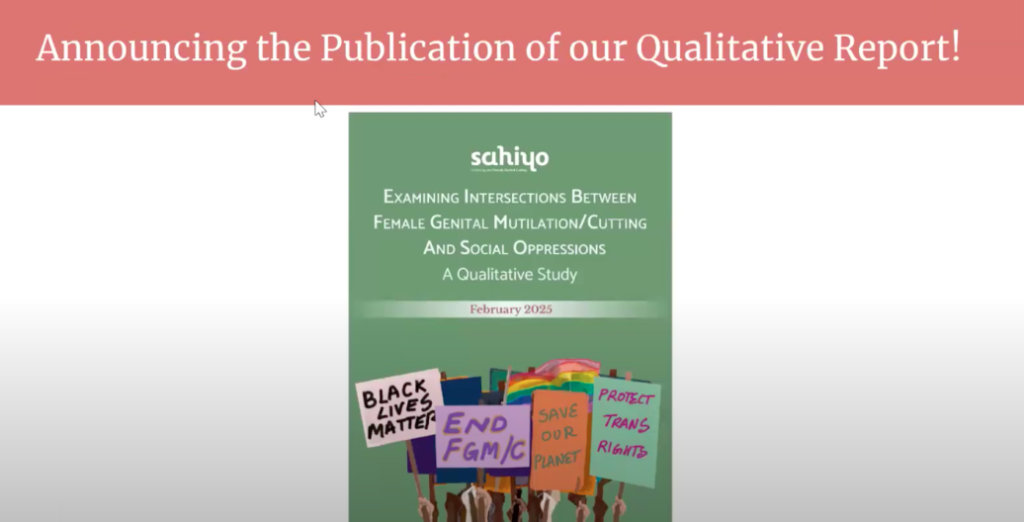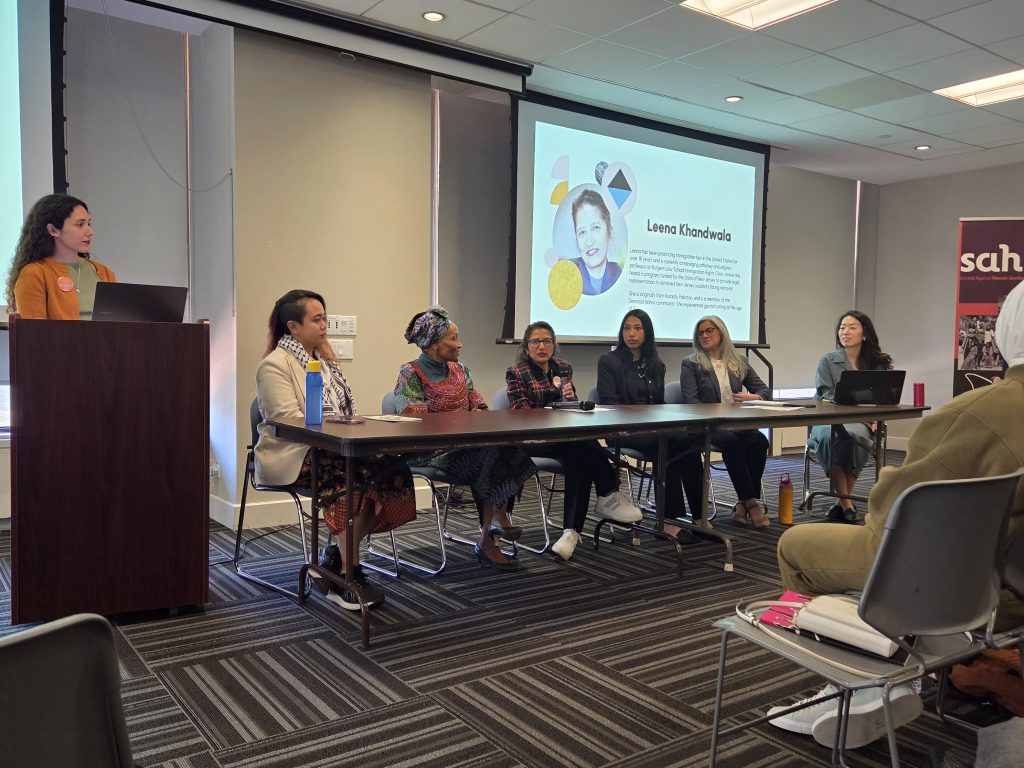Reflecting on the Critical Intersections Webinar

On February 27th, Sahiyo’s Research Coordinator Rachel Wine, and Executive Director Mariya Taher led the webinar, “Intersectional Approaches Strengthen Alliances and Build Movements to End FGM/C,” to announce the publication of the third and final report for Sahiyo’s Critical Intersections Research Project project, Examining Intersections Between Female Genital Mutilation/Cutting and Social Oppressions: A Qualitative Study. The event explored Sahiyo’s Critical Intersections Research Project from its inception in 2021 to the present in 2025. Mariya shared how a 2021 webinar focused on how racism impacted the movement to end FGM/C inspired the Critical Intersections research project. While, Rachel gave an overview of the findings from our first two reports: Examining the Current State of Critical Intersections: Female Genital Mutilation/ Cutting and Social Oppressions Examining Intersections Between Female Genital Mutilation/Cutting and Social Oppressions A Mixed Methods Study Throughout the course of this three-year project, many researchers supported the work and they too shared their experiences during the webinar with partner researcher Naquia highlighting the key intersections found in this newest report: race/racism, LGBTQIA+ issues, gender inequities, and religious discrimination. Another partner researcher Jessica Puri and Project Advisors Aarefa Johari and Saza Faradilla spoke about their experiences with intersectionality in their own work surrounding FGM/C, and how the findings from the report can strengthen the movement to end FGM/C. In specific, Aarefa discussed how religion intersects with FGM/C in India, and Saza touched on the benefits of framing FGM/C through the lens of gender to recognize FGM/C is a form of gender-based violence. Naquia spoke to the framing aspect and asked readers of the report to consider the importance of language and the complex nature of FGM/C when engaging in activism to end it Rachel ended the webinar, by uplifting the four recommendations from the report: To coordinate with social service sectors across various social justice issues Improve language and framing of FGM/C Increase education on how FGM/C is intersectional Implement more diverse and equitable approaches to data collection, analysis, and dissemination Each recommendation was accompanied by a suggested action item for those in the FGM/C sphere to help them incorporate intersectionality into their approaches and advocacy. As the anti-FGM/C field looks to the future of their work, the Critical Intersections Research Project makes it clear that intersectional collaboration is crucial to creating social change and ending this human rights violation. Watch the webinar recording here. Learn more about the Critical Intersections Research Project here.
Reflecting on “Storytelling as a Tool for Female Genital Mutilation/ Cutting (FGM/C) Survivor-Centered Change” at CSW 69

On March 18, 2025, Sahiyo co-hosted a powerful parallel session during the 69th Commission on the Status of Women titled “Storytelling as a Tool for FGM/C Survivor-Centered Change.” Organized in partnership with the Voices to End FGM/C program collaborators—Silence Speaks and the Asian Women’s Shelter—the event took place at the Church Center for the United Nations in New York. The event highlighted the experiences and powerful narratives of survivors and advocates, exploring storytelling as an effective method to foster understanding and drive social change. The session was facilitated by Sahiyo co-founder and Executive Director Mariya Taher and moderated by Su Young from the Asian Women’s Shelter. Speakers included Zehra Patwa, Dena Igusti, Saza Faradilla, Leena Khandwala, and Angela Peabody, each offering unique perspectives and deeply personal experiences to the conversation. During the panel, two of the storytellers, Zehra and Leena, reflected on the renewed and unexpected emotions they felt while watching their digital stories again. As participants in Sahiyo’s inaugural Voices to End FGM/C workshop (formerly called Sahiyo Stories), it had been a long time since they’d both viewed their stories, particularly in a public setting. This moment reminded us how powerful and vulnerable storytelling can be—even long after the initial release of the stories. As members of the Dawoodi Bohra community, both Zehra and Leena spoke about the resistance they’ve faced for addressing FGM/C openly. Still, they each shared how, at different moments in their journeys, speaking out has not only empowered them personally but has also helped spark dialogue and awareness within their families and broader social circles. Another impactful moment was the discussion around language. Saza, who recorded her story in Bahasa Melayu, shared that although she doesn’t feel especially fluent in her community’s native tongue, she felt strongly that it was important to tell her story in that language. For her, doing so was a way to reach members of her own community in Singapore and the broader diaspora. She expressed hope that her story might resonate with communities in Malaysia, Indonesia, and Brunei, where similar experiences are generally underrepresented, and oftentimes never even spoken of. Angela also shared a deeply personal reflection. Though not a survivor herself, she spoke about how creating her digital story during the workshop marked the first time she talked openly about what happened to her childhood friend who underwent FGM/C. She recalled seeing her friend again two years after she went into the Greibo bush and wondering why she no longer wanted to play with her. Angela’s story was a powerful reminder of how FGM/C can impact not only those who experience it directly but also those around them. Dena, a trans-nonbinary survivor of FGM/C, spoke openly about the internal struggles they faced while developing their digital story. They described grappling with feelings of not being “trans enough,” or even “a survivor enough.” Their vulnerability in naming these feelings brought attention to the nuanced layers of identity, belonging, and validation that many look for when deciding to share their stories publicly. Many attendees were excited and expressed a desire to see more of the digital stories and learn from Sahiyo’s storytelling model. We’re hopeful that these conversations will lead to new partnerships and expanded opportunities to support survivors in sharing their experiences, on their own terms and in their own voices. Visit our Voices to End FGM/C website to learn more!
